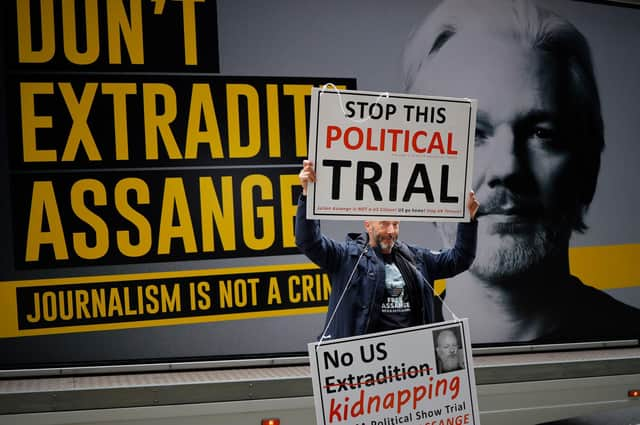Julian Assange's extradition case is about more than the fate of one man – Dr Paul Arnell


Litigation is contentious, at times acrimonious. There is but one winner, and one loser. The stakes are often high. Not quite life and death, but almost. Such a case has been playing out in the Old Bailey this week. It is set to continue for another three. That case is the extradition hearing of Julian Assange.
The Australian founder of Wikileaks is facing the prospect of being sent to the United States to stand trial on charges under its espionage and computer conspiracy laws. If extradited and convicted he faces a maximum possible sentence of 175 years.
Advertisement
Hide AdAdvertisement
Hide AdIf such a sentence was imposed and applied in full it would mean that Assange would spend the rest of his life in prison. The stakes could hardly be higher.
Possible life in prison versus liberty is, for Assange, the most important conflict at issue in his hearing. For human rights, extradition law and journalism however, there are others. Indeed, Assange’s case brings together these issues and more in a confluence of conflict which, in turn, mirrors various political and popular themes emerging in the early 21st century.
At the heart of the case from Assange’s perspective is whether his legal team can establish any of the grounds that can stop his transfer, called bars to extradition. Deciding this issue at first instance is District Judge Vanessa Baraitser. Amongst the most relevant grounds are human rights. If it can be established that Assange’s rights to be free from inhuman punishment, a fair trial or freedom of expression are violated, for example, his extradition will be stopped.
It appears clear that a violation of these rights is arguable. Possible life imprisonment in the US and being tried as the notorious founder of Wikileaks and partner of former US soldier Chelsea Manning in exposing US state secrets on the website concern each of these rights.
The point to be made here is that there are thresholds and limits to human rights. Merely being arguable does not give rise to a violation.
To establish a breach of the right to a fair trial, for example, there must be real risk of a flagrant denial of justice. Conflicting and contrasting arguments will be put forward by lawyers for Assange and the United States for and against a breach of human rights.
A related conflict has long existed in extradition. It arises from the process having two opposing functions; protecting requested persons and facilitating co-operation with partner countries.
Extradition law, for example, has historically prevented individuals from being sent abroad to be tried in person for political crimes or reasons (something that will be argued by Assange’s lawyers).
Advertisement
Hide AdAdvertisement
Hide AdMore recently, the law has come to act to stop persons being sent to face a possible death sentence. Protection from other human right violations has also found a place in the law.
In contrast to protection is the co-operative function. It exists to facilitate criminal justice between kindred friendly countries. Treaties are agreed on the subject, and the process operates on a reciprocal basis.
Countries are inclined to agree to a request for the simple reason that they would like their own requests to be met with a favourable response in future. Further, the fight against terrorism, drug trafficking and cybercrime are all high up the political agenda. It also helps that securing a high-profile accused terrorist or cyber-criminal from abroad makes good headlines.
A conflict unique to Assange’s extradition case is between the freedom of expression and state security. The tension between journalistic freedom and harmful espionage against US interests, perhaps with fatal consequences, forms a novel and important facet of the hearing. This feature of the case is responsible for the considerable media, celebrity and public interest in the hearing.
The right to freedom of expression is guaranteed by article 10 of the European Convention on Human Rights. It provides that the right to impart information should be without interference by a public authority. Notably, however, it is a qualified right that can be lawfully restricted on grounds including national security. A central question for the judge here is whether it would be a disproportionate interference with Assange’s freedom of expression to extradite him to the US to face trial for espionage and computer conspiracy charges.
The law is never simple. The accommodation of widely conflicting interests is an impossible task. Where the stakes are so high, decisions are magnified. It is important to remember, though, the specific issues under consideration at the Old Bailey are those found in the Extradition Act 2003 alone. The ‘special-relationship’ between the UK and the US and views of Assange, or Donald Trump for that matter, will play no role.
The decision of the District Judge will be made on the evidence led in support of and opposition to the bars to extradition. Those bars are set at a high level. Only rarely in UK practice is an extradition request refused.
It is clear that Assange’s case is an exceptional one that graphically brings to the fore important and difficult conflicts.
Advertisement
Hide AdAdvertisement
Hide AdIt remains to be seen whether it will be a rare instance of an extradition request being refused. What is certain is that, out of the maelstrom, Assange’s immediate fate will be decided. His extradition will be given the green light or he will be set free.
Dr Paul Arnell, Law School, Robert Gordon University